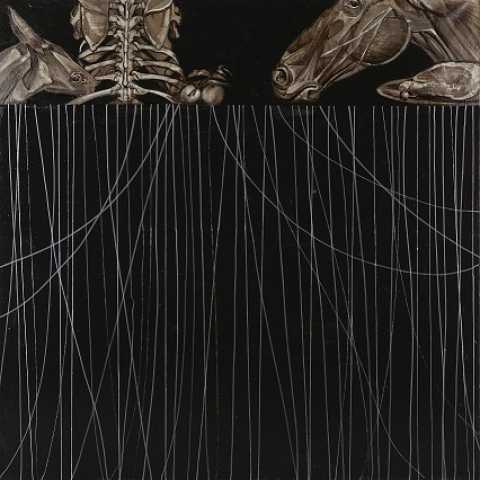Erarta Galleries
8 Berkeley Street
London
W1J 8DN
United Kingdom

Erarta Galleries LONDON is delighted to present Undiscerning Appetites, a new exhibition by Ilya Gaponov. The exhibition will be accompanied by a catalogue with an introduction by Evgeny Lebedev, one of Gaponov's foremost collectors.
Undiscerning Appetites, a new series by Ilya Gaponov, is inspired by the memento mori (from Latin as 'Remember you must dieâ€) style of still life emphasizing the brevity of all earthly delights. The artist has adopted as the main plot for his new exhibition a passage from the Book of Revelation (2:18 - 2:29), in which God sends a message to the church at Thyatira (modern-day Akhisar in Turkey). The message speaks of the wife of King Ahab, Jezebel, whose name is associated with the Apocalypse, with heresy and with depravity. Jezebel is important to the artist as a symbol of contemporary society. Gaponov's work, like this passage from the Bible, is an attempt to capture the pre-apocalyptic condition of our own world.
In her essay 'Objects of Desire: the Modern Still-Life,†curator Margit Rowell suggests that, 'Throughout history the still life has been defined as a composition of inanimate (usually domestic) objects, and it is this fundamental limitation that has allowed, indeed obliged, artists to exhibit a high degree of imagination and invention in order to achieve true originality in the genre.†This originality might be located in formal and technical innovation, but it also might be obtained through a reimagining of what qualifies as suitable subject matter for the still life genre. Gaponov's still-lives present a kind of originality on both levels. First the use of Kuzbass varnish (bitumen) as painting material, and, second, the depiction of decadent contemporary objects in total contrast with the warm domestic interiors of 17th century Dutch still-lives with thei r display of precious, rare, and often hand-crafted luxuries. Gaponov's work has symbolically coded messages warning against indulgence and uncontrolled consumption of food and goods.
Although Undiscerning Appetites is more dramatic than traditional 17th century memento mori images, the final message remains the same: Life is short and can end at any moment. Like Dutch still-lives, these paintings also warn viewers to be careful of what they consume. Gaponov's allusions to the tradition of the memento mori reveal both the depth of his immersion in the history of the still-life genre and the ways in which he breaks from this history, creating new forms and adopting new subjects appropriate to his own distinctive cultural background.
Gaponov's art highlights the fact that we have deeply complicated relationships with the world of objects either of secular or religious nature. His still-life paintings present an invitation to think about these relationships, how they are formed and what they might tell us about our moment in history.
Ilya Gaponov studied Fine Art at both Paris' Ecole des Beaux Arts and the Mukhina Academy in St. Petersburg. He has exhibited widely throughout Russia and participated in numerous international art fairs. His work can be found in prominent private collections in Russia, France and the UK.
The exhibition is curated by Diego Giolitti. A catalogue will be published to coincide with the exhibition and will feature an introduction by Evgeny Lebedev and an essay by Dr. Diego Giolitti.
Diego Giolitti writes about Ilya Gaponov for The Huffington Post
Erarta Galleries London
8 Berkeley Street
London, W1J 8DN
020 2499 7861
